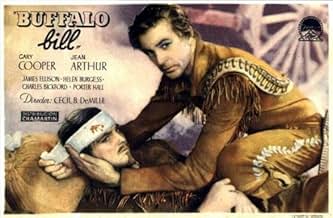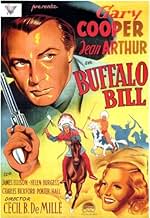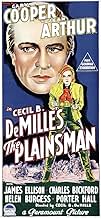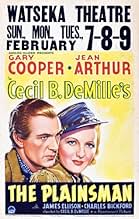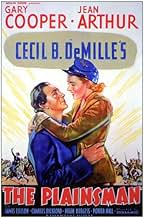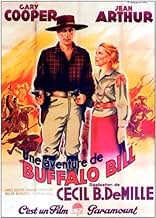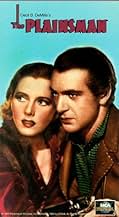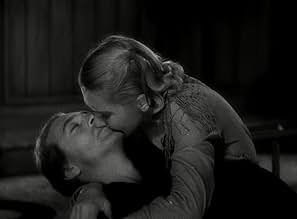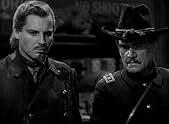IMDb RATING
6.8/10
2.6K
YOUR RATING
Wild Bill Hickok and Buffalo Bill Cody attempt to stop an Indian uprising that was started by white gun-runners.Wild Bill Hickok and Buffalo Bill Cody attempt to stop an Indian uprising that was started by white gun-runners.Wild Bill Hickok and Buffalo Bill Cody attempt to stop an Indian uprising that was started by white gun-runners.
- Awards
- 3 wins total
Fred Kohler
- Jake - A Teamster
- (as Fred Kohler Sr.)
Pat Moriarity
- Sgt. McGinnis
- (as Pat Moriarty)
6.82.5K
1
2
3
4
5
6
7
8
9
10
Featured reviews
Trails cross sometimes
This Cecil B. DeMille epic of the old West contains what may be Jean Arthur's finest performance, as a hysterical, eccentric, incurably amoral, but devotedly doting Calamity Jane. She really pulled it off! Gary Cooper is at his most taciturn, but manages some occasional pithy sayings: 'The plains are big, but trails cross ... sometimes.' The story is a pastiche to end all pastiches. All the cowboy heroes of Western lore seem to be in there somehow except for Jesse James. Even Abraham Lincoln opens the story in person (or at least, DeMille would have us believe so). There is no room for anything so evanescent as subtlety, this is a 'stomp 'em in the face' tale for the masses. A remarkable thing about this film however is that it is a very early full frontal attack on what Eisenhower was eventually to name 'the military industrial complex'. It isn't just a story about gun-runners, but about arming anyone for money, and doing so from the heart of Washington. But let's not get into politics, let's leave that to DeMille, who can be guaranteed to be superficial. The chief interest of this film all these years later is that it uses the first film score composed by George Antheil, who has a lot to say about the job in his autobiography, 'Bad Boy of Music'. Antheil seems to have originated 'the big sound' adopted by all subsequent Westerns, whereby the plains sing out with the voices and sounds of countless cowboys in the sky, celebrating the open spaces and interweaving common melodies. That is why it does not sound at all unusual, because we have heard it a thousand times. But he seems to have been the first to summon up the combined rustlings of all the sage brush into this symphony of the open skies which has entered into American mythic lore, and given it a soundtrack which has never varied since then, corny as it may be, but doubtless appropriate. It is amusing to see Anthony Quinn in an early appearance as a Cheyenne Indian. Gabby Hayes is in there somewhere, but you miss him in the crowd. Gary Cooper overtops them all, looming large, - but when did he ever loom small?
Riproaring saga of the west
The master of movie spectacle Cecil B. De Mille goes West. Using three legends of the old west as its protagonists (they probably never met),Gary Cooper is portraying Wild Bill Hickock,James Ellison as Buffalo Bill and Jean Arthur does make a nice Calamity Jane. The story serves only for De Mille to hang some marvelous action sequences on, like the big Indian attack.Scenes like that are extremely well done.If you don't mind the somewhat over-the-top performances of the cast this is an very entertaining western.Look out for a very young Anthony Quinn essaying the role of an Indian brave who participated at the battle of Little Big Horn.This part got him at least noticed in Hollywood.
Silly Fun
Wild Bill Hickock, Buffalo Bill Cody, and Calamity Jane fight alongside General Custer and expose a scheme by greedy arms manufacturers to sell repeating rifles to renegade Indians.
This somewhat gratuitous exercise in wild west name-dropping is pretty silly but also fairly entertaining as well, though it's a bit too long and runs out of steam near the end.
Also, it might be off-putting to many modern viewers due to it's politically incorrect, stereotyped treatment of Indians.
The feisty Jean Arthur is extremely cute as Calamity Jane and easily runs away with the picture.
Recognizable cameos include iconic western sidekick George "Gabby" Hayes as a wounded scout and director Cecile B. DeMille's future son-in-law Anthony Quinn as the Cheyenne brave who relates the news of Custer's last stand to Cody and Hickock.
This somewhat gratuitous exercise in wild west name-dropping is pretty silly but also fairly entertaining as well, though it's a bit too long and runs out of steam near the end.
Also, it might be off-putting to many modern viewers due to it's politically incorrect, stereotyped treatment of Indians.
The feisty Jean Arthur is extremely cute as Calamity Jane and easily runs away with the picture.
Recognizable cameos include iconic western sidekick George "Gabby" Hayes as a wounded scout and director Cecile B. DeMille's future son-in-law Anthony Quinn as the Cheyenne brave who relates the news of Custer's last stand to Cody and Hickock.
Plain
Surely the only Western featuring Wild Bill Hickok, Calamity Jane, Buffalo Bill Cody, George Custer, and Abraham Lincoln! After a slow start, it hits its stride for a while but eventually runs out of ideas and seems to go on forever. Cooper tries hard to make Hickok come alive and Arthur brings her usual spunk to Calamity Jane but Ellison is over matched as Buffalo Bill. DeMille's direction is uninspired; it seems he was more interested in creating an epic than telling a good story. There is enough decent material here that a good director and editor could have turned it into an exciting movie of about 90 minutes. Sadly, Burgess, who plays Mrs. Cody in her film debut, died a year later at age 20.
Greed and Indian Annihilation
With the end of the North American Civil War, the manufacturers of repeating rifles find a profitable means of making money selling the weapons to the North American Indians, using the front man John Lattimer (Charles Bickford) to sell the rifles to the Cheyenne. While traveling in a stagecoach with Calamity Jane (Jean Arthur) and William "Buffalo Bill" Cody (James Ellison) and his young wife Louisa Cody (Helen Burgess) that want to settle down in Hays City managing a hotel, Wild Bill Hickok (Gary Cooper) finds the guide Breezy (George Hayes) wounded by arrows and telling that the Indians are attacking a fort using repeating rifles. Hickok meets Gen. George A. Custer (John Miljan) that assigns Buffalo Bill to guide a troop with ammunition to help the fort. Meanwhile the Cheyenne kidnap Calamity Jane, forcing Hickok to expose himself to rescue her.
The dated "The Plainsman" is a great deception, with a pretentious and shallow story without historical accuracy, "politically incorrect" in the present days and a terrible screenplay that wastes Gary Cooper and Jean Arthur. Their performances are below average with awful characters. The best part is the beginning, with the inception of the lobby of the greedy manufacturers of weapons using the repeating rifles to provide Indian (and also "white man") annihilation in the name of the pockets full of money. My vote is five.
Title (Brazil): "Jornadas Heróicas" ("Heroic Journeys")
The dated "The Plainsman" is a great deception, with a pretentious and shallow story without historical accuracy, "politically incorrect" in the present days and a terrible screenplay that wastes Gary Cooper and Jean Arthur. Their performances are below average with awful characters. The best part is the beginning, with the inception of the lobby of the greedy manufacturers of weapons using the repeating rifles to provide Indian (and also "white man") annihilation in the name of the pockets full of money. My vote is five.
Title (Brazil): "Jornadas Heróicas" ("Heroic Journeys")
Did you know
- TriviaJohn Wayne very much wanted the role of Wild Bill Hickok, which he felt certain would make him a star, but director Cecil B. DeMille wanted Gary Cooper instead.
- GoofsOn the evening of Lincoln's assassination Van Ellyn and his associates are discussing the supposedly then current John Soule editorial, "Go West, Young Man." Lincoln was murdered in 1865. Soule wrote that famous line in 1851.
- Quotes
Calamity Jane: Tip your hat when you speak to a lady!
Wild Bill Hickok: I will... when I speak to a lady.
- Alternate versionsThe UK DVD is cut by 2 secs to remove a horsefall.
- ConnectionsFeatured in The Hollywood Collection: Anthony Quinn an Original (1990)
- SoundtracksWhen Johnny Comes Marching Home
(1863) (uncredited)
Written by Louis Lambert
Played as background music for the first scene, Washington, D.C.
- How long is The Plainsman?Powered by Alexa
Details
- Release date
- Country of origin
- Language
- Also known as
- Čovek iz Prerije
- Filming locations
- Cheyenne Indian Reservation, Lame Deer, Montana, USA(Custer's massacre)
- Production company
- See more company credits at IMDbPro
Box office
- Budget
- $1,000,000 (estimated)
- Runtime
- 1h 53m(113 min)
- Color
- Aspect ratio
- 1.37 : 1
Contribute to this page
Suggest an edit or add missing content


